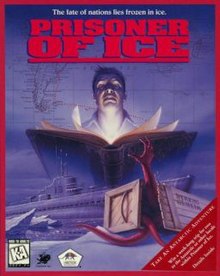Prisoner of Ice
| Prisoner of Ice | |
|---|---|
 | |
| Developer(s) | Infogrames |
| Publisher(s) | |
| Platform(s) | MS-DOS, Microsoft Windows, Mac OS, Sega Saturn, PlayStation |
| Release | MS-DOS, Microsoft Windows & Mac OSSega Saturn
|
| Genre(s) | Adventure |
| Mode(s) | Single-player |
Prisoner of Ice (also Call of Cthulhu: Prisoner of Ice) is an adventure game developed and released by Infogrames for the PC and Macintosh computers in 1995 in America and Europe. It is based on H. P. Lovecraft's Cthulhu Mythos, particularly At the Mountains of Madness, and is a follow-up to Infogrames' earlier Shadow of the Comet. In 1997, the game was ported to the Sega Saturn and PlayStation exclusively in Japan.
Plot[]
Prisoner of Ice begins during the run-up to World War II, primarily around Antarctica. The main character is a young U.S. intelligence officer, Lt. Ryan, who has been assigned to a British submarine, HMS Victoria, for a special mission. As the game begins, the submarine is fleeing the Antarctic after rescuing a Norwegian who has recently escaped from a secret German base in the Antarctic (it is later revealed that the base is built atop the Ancient Ruins mentioned in At the Mountains of Madness). Along with the Norwegian, the sub has picked up two mysterious cargo crates stolen from the Nazis.
Late in the game, in Argentina, Ryan meets John Parker, the central character from Shadow of the Comet, and reveals the links between the two games. Narackamous, the main antagonist of Shadow of the Comet, also returns.
The game has a choice of two endings, though there is little difference between them.
Gameplay[]
The game involves solving puzzles through a point and click user interface. The player can examine any item and, depending on the item, either pick it up, use another item on it, or operate it in some way.
Some puzzles, if not completed within a short span of time (always less than a minute), will result in a game over. To ensure that the player does not get stuck by saving their game at a point from which they cannot possibly complete a puzzle in time, the game autosaves onto a separate save file at the beginning of each timed puzzle.
Release[]
The game was released for PC DOS, PC Windows and Macintosh computer platforms in America (where it was published by I Motion) and Europe in 1995. It was released as Call of Cthulhu: Prisoner of Ice in PAL territories.
Three French-language comic books were published as tie-ins to the game: La Geôle de Pandore (Pandora's Jail), Le Glaive du Crépuscule (The Dagger in the Dusk) and La Cité des Abîmes (The City of the Depths).[1]
In Japan, the game was released in 1997 as Prisoner of Ice: Jashin Kourin, and ported to the Sega Saturn and Sony PlayStation game consoles. These ports contain no enhancements from the PC versions. The English voice acting of the PC version is retained, but the text which appears when examining or picking up objects is translated to Japanese. The Saturn version is compatible with the Netlink Mouse.
In 2015, Prisoner of Ice and Shadow of the Comet were re-released as DRM-free on GOG.com for modern computers.[2]
Reception[]
| Publication | Score |
|---|---|
| Next Generation | |
| Computer Game Review | 85/78/80[4] |
According to the French newspaper Les Échos, Prisoner of Ice was commercially successful. Its sales surpassed 30,000 units in the United States alone during its first day of release.[5]
A reviewer for Next Generation gave the PC version three out of five stars, praising the gripping storyline, beautiful animation, and eerie atmosphere, but criticized the "emotionless" voice acting. He concluded, "It's worth checking out for the great storyline and art, but not good for much else."[3]
See also[]
- Call of Cthulhu: Beyond the Mountains of Madness
References[]
- ^ "Toc - Inspiration - Prisoner of Ice I: La Geôle de Pandore" [Prisoner of Ice I: Pandora's Prison] (in French). Archived from the original on 2013-03-31.
- ^ GOG.com. "RELEASE: CALL OF CTHULHU: SHADOW OF THE COMET + PRISONER OF ICE". GOG.com. Archived from the original on 22 July 2015. Retrieved 22 July 2015.
- ^ Jump up to: a b "Prisoner of Ice". Next Generation. Imagine Media (12): 192. December 1995.
- ^ Snyder, Frank; Chapman, Ted; Kaiafas, Tasos (December 1995). "Frozen Assets". Computer Game Review. Archived from the original on December 21, 1996. Retrieved May 11, 2020.CS1 maint: uses authors parameter (link)
- ^ P.M. (December 20, 1995). "Course au réalisme chez les éditeurs". Les Échos. Archived from the original on July 17, 2018.
External links[]
- 1995 video games
- Infogrames games
- Adventure games
- Point-and-click adventure games
- Call of Cthulhu (role-playing game)
- DOS games
- Games commercially released with DOSBox
- Classic Mac OS games
- Nazism and occultism
- PlayStation (console) games
- Sega Saturn games
- Single-player video games
- Cthulhu Mythos games
- Video games about time travel
- Video games based on works by H. P. Lovecraft
- Video games developed in France
- Video games set in Antarctica
- Video games set in Argentina
- Video games set in the 1930s
- Video games with alternate endings
- Windows games
- Works based on At the Mountains of Madness
